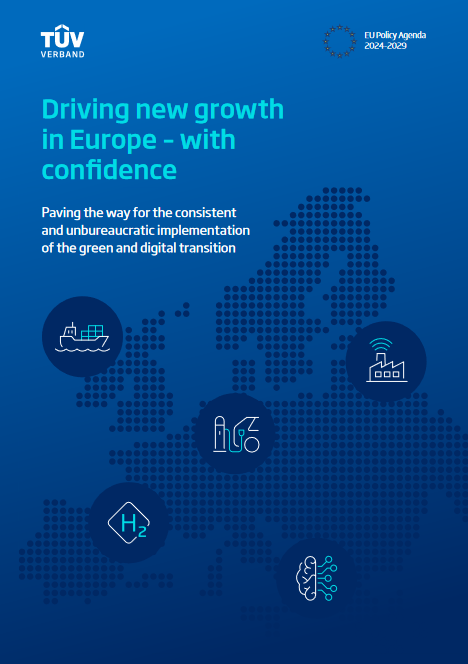Further education and training
European Elections 2024: Driving new growth in Europe
![[Translate to English:] [Translate to English:]](/fileadmin/_processed_/e/5/csm_christian-wiediger-ueLA4x2gZf8-unsplash_150f15525d.jpg)
 Over the past five years, the European Union (EU) has set the course for the green and digital transition. At the same time, Europe has faced major economic, social and political challenges due to numerous crises, which it must work to overcome in the next legislative period. This will only be possible if the issues of climate action, digitalisation, social justice and economic growth are addressed collectively. The transition that has been initiated must now rapidly be implemented with minimal bureaucratic burdens on all levels. As service providers for industry, independent assessment organisations such as the TÜV are reliable partners that support policymakers and companies in establishing a green and digital economy.
Over the past five years, the European Union (EU) has set the course for the green and digital transition. At the same time, Europe has faced major economic, social and political challenges due to numerous crises, which it must work to overcome in the next legislative period. This will only be possible if the issues of climate action, digitalisation, social justice and economic growth are addressed collectively. The transition that has been initiated must now rapidly be implemented with minimal bureaucratic burdens on all levels. As service providers for industry, independent assessment organisations such as the TÜV are reliable partners that support policymakers and companies in establishing a green and digital economy.
Download our Policy Agenda 2024-2029 here
Our policy sheets on the European Elections 2024
Our core recommendations for the next legislative period
Establish Europe as lead market for green and digital technologies of the future
- Ensure the ‘Made in Europe’ quality promise of green and digital technologies such as hydrogen, CCS/CCU and AI through legislation, standardisation and certification
- Prioritise and consistently drive the digitalisation of industry and administration to overcome the current political challenges
- Strengthen the cybersecurity of communication infrastructure such as state data networks, satellites and digital applications to safeguard European sovereignty
Ensure a secure and green energy supply for Europe
- Speed up the expansion of renewable energies through further harmonisation and investments
- Foster acceptance of hydrogen infrastructure through independent assessments of systems
- Consistently raise the energy efficiency targets for all sectors and ensure compliance through independent certifications
Make AI `Made in Europe‘ a success through uniform implementation of the AI ACT
- Rapidly specify the requirements for AI through harmonised standards and implementation guidelines
- Achieve full assessment readiness among all stakeholders and establish national regulatory sandboxes as quickly as possible
- Enable the participation of all stakeholders in the EU Advisory Forum (including Notified Bodies)
Speed up the Mobility Transition with effective Measures to achieve sustainability and Vision Zero
- Establish standardised assessment procedures for vehicles of the future, enable assessments by independent third parties at any time
- Consistently pursue the transition to low-emission, climate-neutral mobility and fully utilise the potential for improving air quality and mitigating climate change
- Increase road safety using all available means in view of the rise in road fatalities, focus on the dangers of alcohol and drugs in road traffic
Implement EU Legislation efficiently to relieve the market
- Involve private sector organisations to accelerate implementation processes
- Use independent assessment organisations as a market-relieving alternative to intervention by public authorities
- Ensure uniform accreditation practices in Europe – eliminate unilateral national interpretations of accreditation requirements and create a level playing field
 The role of independent Testing Organisations in the economic transformation
The role of independent Testing Organisations in the economic transformation
From the market ramp-up of new technologies such as green hydrogen, sustainable batteries and artificial intelligence through expansion of the energy infrastructure in Europe to ensuring corporate due diligence: As market players offering a comprehensive service portfolio for industry, independent assessment organisations support and enable companies and authorities to achieve an economic transformation in Europe. With their expertise, neutrality and objectivity, they ensure that regulatory requirements are met and implemented. This relieves the burden on supervisory authorities and companies, reduces government spending, speeds up processes and procedures, and reinforces the necessary trust among all economic players.
Our added value
Why are independent third-party assessments necessary? How much do they cost and how long do they take? Who checks the independent assessment organisations? There are several questions we are often beung asked. You can now find the most frequently asked questions and answers in our FAQ on independent third-party assessments.
Your contact for the European elections
![Johannes Kröhnert [Translate to Englisch:]](/fileadmin/_processed_/1/7/csm_TUEV-Verband_Johannes_Kroehnert__C__Tobias_Koch__1__1500px_613ddd3a47.jpg)










